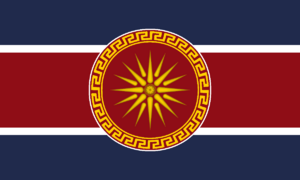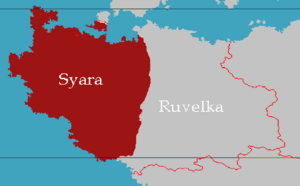Republic of Syara: Difference between revisions
(Created page with "{{Infobox former country |native_name= Republika Sijara |conventional_long_name = Republic of Syara |common_name= Syara |status= |era = |event_start= [[Conference of Pella]...") |
No edit summary |
||
| (One intermediate revision by the same user not shown) | |||
| Line 38: | Line 38: | ||
The ''' Republic of Syara''' (Syaran: ''Republika Sijara'') was a sovereign state in western Siduri that existed from 1873 to 1987. The Republic represented the first time all of [[Syara]] had been unified under a single banner since the [[Makedonian Empire]], and was formally established at the [[Conference of Pella]] in 1875. Although officially a democracy, Syaran politics were dominated by the influence of the monarchies of Galania and Makedon, who continued to play an import role in the Republic for most of its existence. | The ''' Republic of Syara''' (Syaran: ''Republika Sijara'') was a sovereign state in western Siduri that existed from 1873 to 1987. The Republic represented the first time all of [[Syara]] had been unified under a single banner since the [[Makedonian Empire]], and was formally established at the [[Conference of Pella]] in 1875. Although officially a democracy, Syaran politics were dominated by the influence of the monarchies of Galania and Makedon, who continued to play an import role in the Republic for most of its existence. | ||
Holding a strategic position at the western mouth of the Sundering Sea, Syara rapidly grew wealthy off of the many trade routes that sailed near the young republic, and by the dawn of the 20th Century Syara had established itself as a major player in Siduri affairs. One of the most defining moments of Syaran history however would come in 1916 with the outbreak of the [[Divide War]], which pitted Syara against the much larger and more powerful [[Cacertian Empire]]. In a surprise victory, Syara triumphed over what many considered the strong nation in the world at the time, leading to a rejuvenation of Syaran nationalism. Following the Divide War Syara took an increasingly vocal and visible role in Siduri affairs, and elevated by nationalist sentiment attempted to form a pan-Siduri alliance, led by Syara. Syara's bellicose attitude however alienated many of the other Siduri nations, and by the 1930s Syara's only continental ally was the fascist [[Allamunnika]]. In 1934 both countries invaded [[Ruvelka]], sparking the [[Siduri War]] following the entry of [[Quenmin], [[Cacerta]], and the [[Kingdom of Tennai]] into the conflict. Syara's eventual surrender in 1938 marked an end to Syaran influence in Siduri as the Republic entered into a period of economic decline caused by the costs of war and its heavy reparations. | Holding a strategic position at the western mouth of the Sundering Sea, Syara rapidly grew wealthy off of the many trade routes that sailed near the young republic, and by the dawn of the 20th Century Syara had established itself as a major player in Siduri affairs. One of the most defining moments of Syaran history however would come in 1916 with the outbreak of the [[Divide War]], which pitted Syara against the much larger and more powerful [[Cacertian Empire]]. In a surprise victory, Syara triumphed over what many considered the strong nation in the world at the time, leading to a rejuvenation of Syaran nationalism. Following the Divide War Syara took an increasingly vocal and visible role in Siduri affairs, and elevated by nationalist sentiment attempted to form a pan-Siduri alliance, led by Syara. Syara's bellicose attitude however alienated many of the other Siduri nations, and by the 1930s Syara's only continental ally was the fascist [[Allamunnika]]. In 1934 both countries invaded [[Ruvelka]], sparking the [[Siduri War]] following the entry of [[Quenmin]], [[Cacerta]], and the [[Kingdom of Tennai]] into the conflict. Syara's eventual surrender in 1938 marked an end to Syaran influence in Siduri as the Republic entered into a period of economic decline caused by the costs of war and its heavy reparations. | ||
Although Syara was able to eventually rebound, the legacy of the Siduri War left long lasting social impacts in Syara, chief among them the rise of anti-Monarchist sentiments directed against the royal families of Makedon and Galania. In the 1960s and 70s the 'Warden' philosophy, a nationalist and fundamentalist grassroots movement began to take hold, and by the 1980s had come to dominate Syaran politics and society with its strong anti-monarchist and revolutionary attributes. In 1983 the Warden dominated High Council attempted to strip the monarchies of their rights and estates, leading to the outbreak of the [[Refusal War]], which ended in a Warden victory in 1987. Following the Monarchist defeat, Syara was reconstituted as a [[Syara|Commonality]], which persists to this day. | Although Syara was able to eventually rebound, the legacy of the Siduri War left long lasting social impacts in Syara, chief among them the rise of anti-Monarchist sentiments directed against the royal families of Makedon and Galania. In the 1960s and 70s the 'Warden' philosophy, a nationalist and fundamentalist grassroots movement began to take hold, and by the 1980s had come to dominate Syaran politics and society with its strong anti-monarchist and revolutionary attributes. In 1983 the Warden dominated High Council attempted to strip the monarchies of their rights and estates, leading to the outbreak of the [[Refusal War]], which ended in a Warden victory in 1987. Following the Monarchist defeat, Syara was reconstituted as a [[Syara|Commonality]], which persists to this day. | ||
| Line 51: | Line 51: | ||
==Legacy== | ==Legacy== | ||
[[Category:Republic of Syara]] | |||
Latest revision as of 03:24, 28 December 2020
The Republic of Syara (Syaran: Republika Sijara) was a sovereign state in western Siduri that existed from 1873 to 1987. The Republic represented the first time all of Syara had been unified under a single banner since the Makedonian Empire, and was formally established at the Conference of Pella in 1875. Although officially a democracy, Syaran politics were dominated by the influence of the monarchies of Galania and Makedon, who continued to play an import role in the Republic for most of its existence.
Holding a strategic position at the western mouth of the Sundering Sea, Syara rapidly grew wealthy off of the many trade routes that sailed near the young republic, and by the dawn of the 20th Century Syara had established itself as a major player in Siduri affairs. One of the most defining moments of Syaran history however would come in 1916 with the outbreak of the Divide War, which pitted Syara against the much larger and more powerful Cacertian Empire. In a surprise victory, Syara triumphed over what many considered the strong nation in the world at the time, leading to a rejuvenation of Syaran nationalism. Following the Divide War Syara took an increasingly vocal and visible role in Siduri affairs, and elevated by nationalist sentiment attempted to form a pan-Siduri alliance, led by Syara. Syara's bellicose attitude however alienated many of the other Siduri nations, and by the 1930s Syara's only continental ally was the fascist Allamunnika. In 1934 both countries invaded Ruvelka, sparking the Siduri War following the entry of Quenmin, Cacerta, and the Kingdom of Tennai into the conflict. Syara's eventual surrender in 1938 marked an end to Syaran influence in Siduri as the Republic entered into a period of economic decline caused by the costs of war and its heavy reparations.
Although Syara was able to eventually rebound, the legacy of the Siduri War left long lasting social impacts in Syara, chief among them the rise of anti-Monarchist sentiments directed against the royal families of Makedon and Galania. In the 1960s and 70s the 'Warden' philosophy, a nationalist and fundamentalist grassroots movement began to take hold, and by the 1980s had come to dominate Syaran politics and society with its strong anti-monarchist and revolutionary attributes. In 1983 the Warden dominated High Council attempted to strip the monarchies of their rights and estates, leading to the outbreak of the Refusal War, which ended in a Warden victory in 1987. Following the Monarchist defeat, Syara was reconstituted as a Commonality, which persists to this day.

